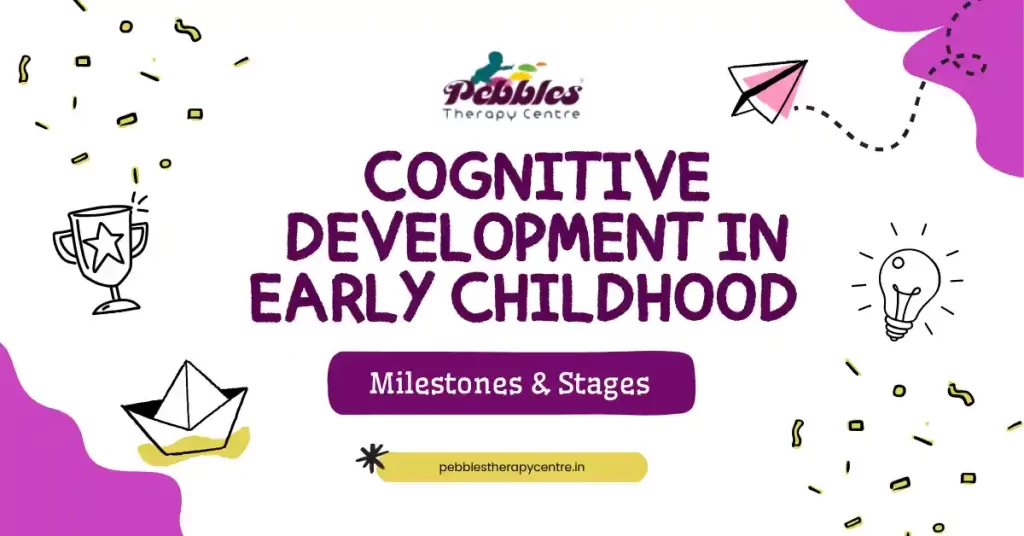Cognitive Development in Early Childhood - Milestones & Stages
In the very beginning years of early childhood, Cognitive development in early childhood builds the fundamental skills such as thinking, problem-solving and understanding that children would need to know about their world. This essential time, usually 2-6 years of age is where all of the base building for future learning and socialization happens. Understanding what is cognitive development in early childhood is instrumental for parents and educators to provide support the growth of a child.
Children are able to develop abilities (that affect everything they will learn in their life) only through milestones, activities and an atmosphere free from stress. Here is a blog post of some of the main nodal points, examples, and environmental influences that define early cognitive development.
What is Cognitive Development in Early Childhood?
Cognitive development the expansion of mental processes such as thinking, memory, attention, language that children must have in order understand and influence their World. A specific stage of cognitive development in early childhood the ages of 2-6 are when early childhood in early childhood ages experience the most scaling. In this developmental time young toddlers will propel from very basic sensory experiences to actualised complexity in thought processes, are able to handle inquiries and seen solving problems independently.
From age two onwards, children begin developing:
- Symbolic thinking: Using objects or words to represent something else.
- Memory skills: Remembering routines and recognizing familiar faces.
- Attention span: Focusing for longer periods on tasks or play.
- Problem-solving: Testing and engaging in cause-effect relations
Some environmental key developmental milestones at this stage are the speaking of words, rudimentary counting and recognising small, few things as well as time. Toddlers pretending to cook, for example, are showing signs of cognitive development as they imitate adults or tell stories.
Developmental sophistication of cognitive processes between ages 4-6. They are beginning to comprehend rules, reason, and ask “why?”. They get what the numbers and letters mean letter, plus they understand how to social norms.
Once a caregiver really understands what is cognitive development in toddlers is vs preschoolers they can use that information so they can enhance the learning experiences specific for what stage each child is in, therefore optimizing what ever stage he or she is in.
Key Stages and Theories of Cognitive
Jean Piaget’s influential theory offers a clear framework to understand cognitive development in early childhood Piaget’s theory. The following stages children went through as they were acquiring mental powers, he noted:
- Sensorimotor stage (birth to 2 years): Infants learn by doing: they discover how objects work through action in sensitivity, Gripping objects and manipulations, infants have a sensorimotor plan
- Preoperational stage (2–7 years): Children explore symbolic thought but are unable to do operations (cannot think about thinking) and demonstrate egocentric perspective taking in their speech.
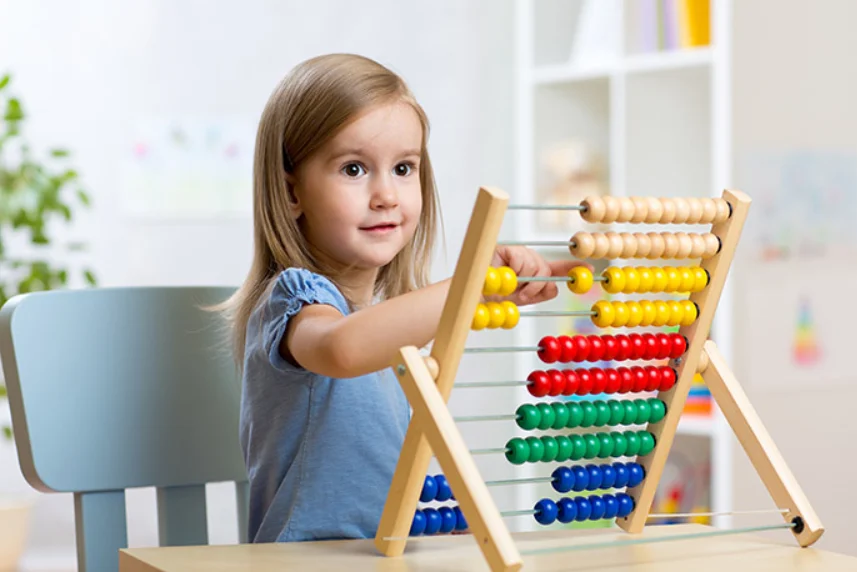
At the preoperational stage, young children are imagination players and use language not only to express but also as the primary tool for thinking which is central to infant and young childhood cognitive and language development in early childhood. Yet the way they think is still egocentric they struggle to see things from other person’s point of view.
By the time children are about in middle childhood (cognitive development in middle childhood of 6–12 years old), they move to the concrete operational stage where thinking becomes logical and they begin classifying, sorting objects, and conserve knowledge (e.g., content remains same despite structure alters). That is a time of further cognitive development and you have to remember this may be how your child’s mind is evolving.
Piaget’s stages mean that children develop at their own pace, but they are useful to show general kinds of cognitive development. Take these stages into consideration when planning age appropriate activities for cognitive development in early childhood and identifying when intervention may be useful.
Examples and Indicators of Cognitive Development
The Typical cognitive development in early childhood appears as skills and behavior observed to indicate the way children perceive information and how they solve problems. Here are the few common examples of cognitive development in early childhood:
- Recognizing and naming colors, shapes, and numbers.
- Following multi-step instructions.
- Engaging in pretend play, which boosts imagination and abstract thinking.
- Asking questions that show curiosity and reasoning, such as “why” and “how” queries.
- Sorting objects by size, color, or type.
- Demonstrating early problem-solving by trying new strategies during play.
Examples of cognitive development in early childhood activities can help nurture these skills, such as:
- Puzzle-solving to enhance spatial reasoning.
- Storytelling to improve memory and sequencing.
- Building blocks to develop fine motor skills and planning.
- Matching games that encourage attention and categorization.
These activities not only foster problem-solving skills but also support language growth and social interaction. Identifying these indicators helps parents and educators track progress and spot potential delays.
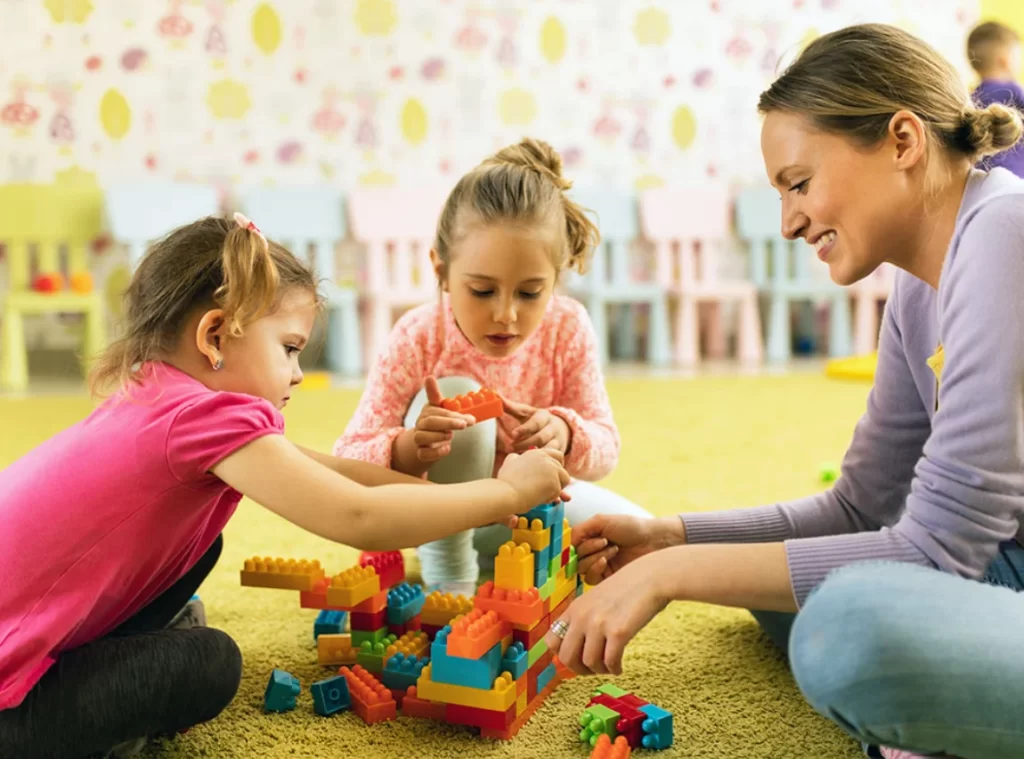
The Relationship Between Physical and Cognitive Development
Early childhood is a time of development for both physical and cognitive development. Gross motor skills and fine motor skills are part of the brain development that is greater when you work on them to support the cognitive part. For instance, playing with small objects helps the hand-eye cooperation when it goes to draw or write.
Brain development; specifically, active physical play: exploration and discovering helps cognitive development. Whether it be running, jumping or climbing help children develop spatial awareness and body balance and control which directly leads to problem solving skills as in understanding where they do(then learn they can (drag).
Child’s play and cognitive development in early childhood should be well known. Play is where we get to practice our theories and make different attempts, socializing. It makes executive functions task like memory, attention and self-regulation better.
Additionally, music and cognitive development in early childhood in general makes a unique contribution because it improves auditory processing, pattern recognition, as well as language skills. The music would also help memory and concentration to be in sync with physical activity.
So, nurturing both physical activities and cognitive tasks get the brain a healthy environment for well-rounded development. Check out Physical Therapy for Autism.
Factors Influencing Cognitive Development
Many factors influencing cognitive development in early childhood shape how children acquire thinking and learning abilities. These influences fall into two broad categories:
- Biological factors: Genetics, brain maturation, and health status impact cognitive potential. Adequate nutrition and sleep are critical for brain function.
- Environmental factors: Language stimulation, social interaction and play provide for optimal cognitive growth.
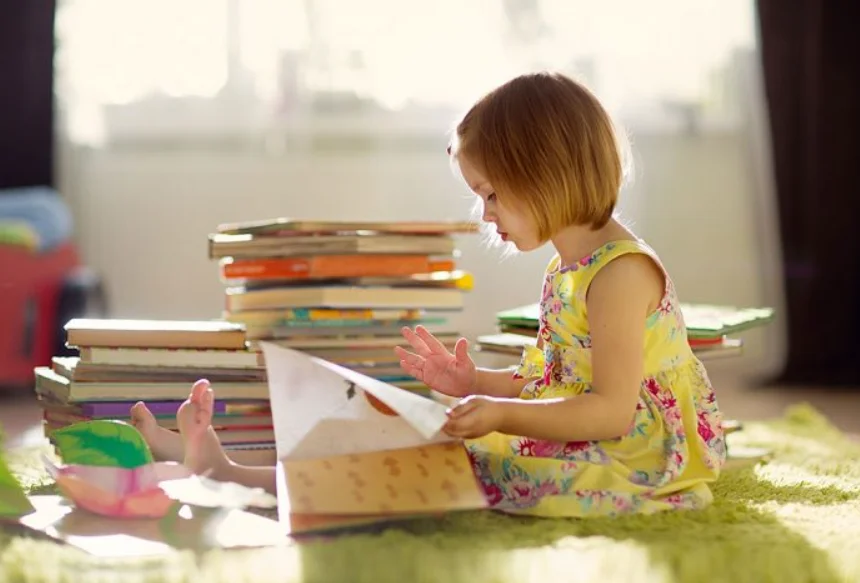
What early childhood education and social-emotional environment do is lasting – impact of early childhood education and social-emotional environment is profound. Students who are in the high quality preschool programs do better, across the board cognitive, memory, and language tasks. Curiosity with caregivers who help build feelings of security and cognitive resilience can be
Long term (or early life) negative influences such as chronic stress or neglect, and deprivation can actually hinder cognitive gains. So, supporting cognitive development in early childhood similarly needs to touch upon these biological and environmental parts integratively.
Promoting Cognitive Development Through Activities
Promoting cognitive development in early childhood hinges on engaging children in meaningful, varied activities. Both structured and unstructured learning play important roles.
Play is a natural way for children to explore and learn. Activities like:
- Role-playing to develop imagination and social skills.
- Puzzles and matching games to enhance memory and problem-solving.
- Singing and dancing for auditory processing and motor coordination.
Music and cognitive development in early childhood link closely; musical activities stimulate brain regions responsible for language, pattern recognition, and executive function.
Structured activities such as storytime or guided experiments develop focus and reasoning. Unstructured free play allows creativity and independent thinking.
Effective activities target key cognitive skills:
- Thinking: Sorting and categorizing objects.
- Memory: Recalling sequences in stories.
- Focus: Completing tasks with minimal distraction.
- Language: Practicing new vocabulary and sentence formation.
Integrating these activities daily fosters steady cognitive growth and prepares children for school challenges.
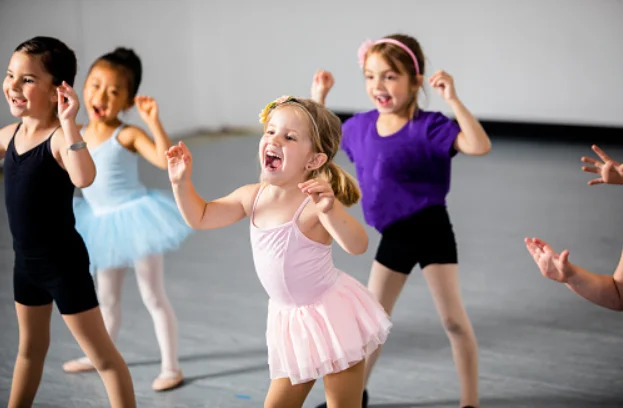
Language Development and Its Role in Cognition
Language is incredibly important for cognitive development in early childhood. From ages 2 – 6 children go on a vocabulary and grammar gold rush, a key developmental period in their ability to communicate ideas and interpret the same in others.
In the very first years of child’s life, Cognitive and language development in early childhood are forever interconnected. Language is central to how we think i.e., categorize, reason and solve problems. So kids will say words that name things and describe episodes via chunking to organize their thought.
Children tell stories, engage in conversations by sequencing events and remembering details which enhances their memory and attention.
Parents and educators can enhance language skills by:
- Reading aloud regularly.
- Encouraging children to describe their experiences.
- Engaging in back-and-forth conversations.
These practices foster deeper cognitive processing and prepare children for more complex learning tasks.
Supporting Cognitive Growth at Home and School
Supporting cognitive development in early childhood requires a collaborative effort between home and school environments. At home, parents can:
- Provide a safe, stimulating space filled with books, puzzles, and art supplies.
- Use positive reinforcement and patience to encourage curiosity.
- Model problem-solving and language use in everyday tasks.
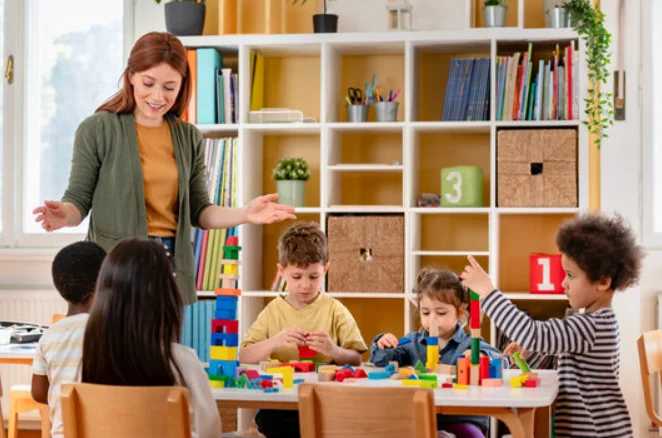
In the classroom, teachers use strategies such as:
- Differentiated instruction tailored to each child’s pace.
- Interactive activities that promote critical thinking.
- Early intervention when delays or difficulties are noticed.
In addition to academics, the early childhood education for cognitive development also include some social, and emotional learning in the play part. A safe haven creates confidence and resilience, so that cognitive demands are tackled with full child capacity.
Objectives and Importance of Cognitive Development in Early Education
The objectives of cognitive development in early childhood focus on equipping children with essential thinking and learning skills. Setting clear goals and tracking milestones ensures that each child reaches their potential.
Key objectives include:
- Enhancing problem-solving and critical thinking.
- Building language and communication abilities.
- Developing memory and attention span.
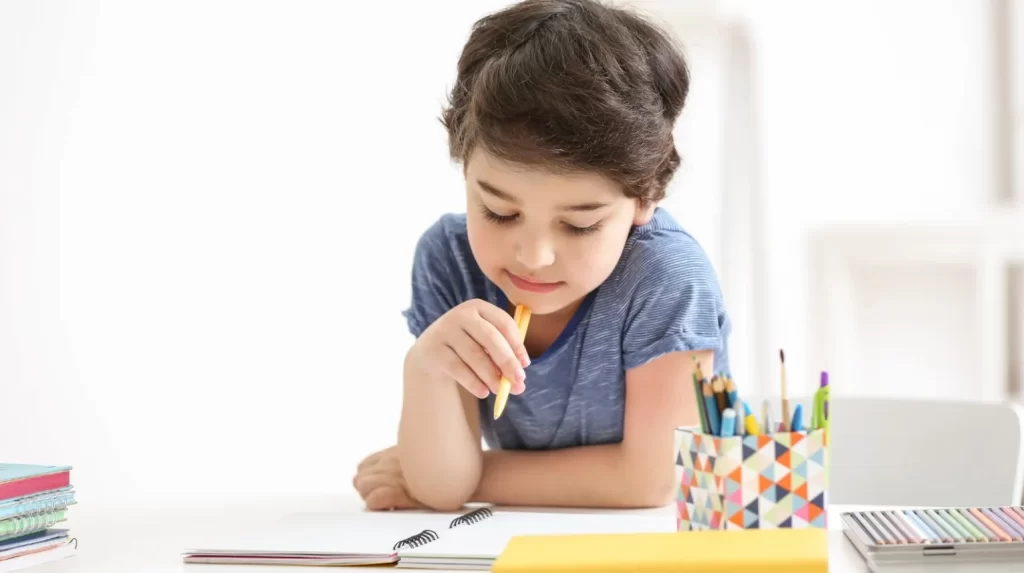
Curriculum adaptation for diverse learners acknowledges that children develop at their own pace. Teachers design lessons to be accessible to all with some accommodations, leading inclusivity and maximization.
The importance of early childhood education in cognitive development (early learning) and brain development form the basis for life-long learning. Early experiences literally mould neural pathways that have lifelong effects on intelligence, creativity and social competence.
Cognitive development in early childhood will provide parents and teachers with the knowledge needed for full blossoming of children’s minds. Milestones recognition, age-appropriate activities and encouraging supportive environment can help the young kids to develop good cognitive skills which are set to determine a lot of their future learning and success. Holistic Physical play, language & Early Ed are equally important. Caregivers can best support the active brain during this critical time by recognizing the many ways these things mesh with development stages.

